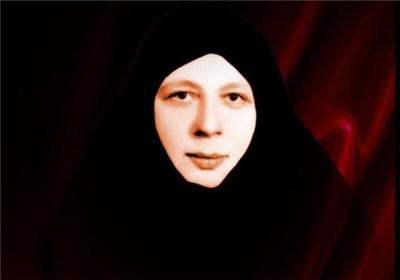According to the world’s history, women are the model of natural freedom and have changed the purposeful and dynamic transformation of lifestyles with their completely wise and thoughtful opinions.
Amina (bint al-Hoda), a girl who shone like a warm sun in the sky of Kazemein in 1938 from the line of Ayatollah Sadr, with the rich background of pure Islamic culture in the lap of scholars and with the upbringing of a mother from the offspring of the Ahlulbayt (PBUH) and the first Shia Muslim woman whose name was recorded in the history of women.
She, who experienced the loss of her father from the very months of her birth, compensated for this loss despite the precious teachings of her mother and brothers and learned elementary literacy in the company of her family without attending schools that promoted western culture.
This lady came to Najaf with her brothers when she was 11 years old and, while raising her scientific status, despite the differences of opinion among religious scholars on how to play the role of women in Islamic societies, she broadened her views on realizing the political and social rights of women of her era by writing awakening articles and books in In order to make women aware of their individual rights and equip them with the power of courage to defend their rights.
Fundamental change of the environment for targeted activity of women
Even though she lived in a closed ideological environment, Bint Al-Hoda took charge of the Islamic education of Iraqi women by establishing al-Zahra schools in Baghdad and Kazemein, and with a deep belief in the fundamental change of the environment for the purposeful activity of women in the era of conflict between tradition and modernity, she is the leader of Iraqi women with a progressive view. became.
Lady al-Sadr, who was intellectually influenced by his brother Seyyed Mohammad Baqer, made a continuous effort in the field of thought and action, and with a coherent intellectual approach, he laid the foundations of the cultural identity of Iraqi women, and considering the role of the enemy in the field of negligent neutralization of soft war she learned as much as he could intelligently and drew a specific intellectual framework to create solutions for women’s problems and created the convergence of Muslim women by ruling Islamic boundaries and loopholes.
Shahideh bint Al-Hoda took literature in the service of belief and thought, and with an engineered approach in works that were in line with the political view of the Imam Khomeini(RA) and the main features of the awakening intellectual system, she brought out the Muslim actress from behind the dark curtains of illusion and self-deprecation and influenced; they left a great impact on the youth of their time.
The brother’s call for Islam led to his arrest in the month of Rajab 1399 AH, when her speech in Imam Ali’s shrine and anti-tyranny revelations led to the brother’s release by the Iraqi Baath government.
A woman from the generation of Seyyed Razi (RA), who had been in a family known for struggle and jihad for a long time, despite suffering from the lack of intellectual and Islamic discourse of women, was not intimidated by difficult circumstances and in 11 months of house arrest by the enemy, with her unique patience and courage; it neutralized the government pressure and restrictions on Islamic propaganda and continued its systematic approach to show the high power of women’s maneuver in the field of macro management at the family and community level.
Strange Martyrdom
The fear of the tremendous transformations crystallized in the scientific and practical works of this lady and her brother in creating a superior society led to the arrest of both of them on 20 Jumadi al-Awli 1400 A.H. by Saddam, so that the rule of the dictator’s regime would bring the sound of global Islamic awakening that resonated through their scholarly services. On the 23rd of Jumadi al-Awli (April 19, 1359 A.H.), these fighters in the field of culture and religion were martyred with the most heinous tortures, and they were buried in an unknown place in a strange way in news censorship with condolences to Jeddah.
Shahideh bint Al-Hoda Sadr, by distorting the issues related to the women’s society, left behind a logical depiction of the transformation of her own situation, and we hope that the women of the present age, following the high thoughts of “Shahideh Sadr”, will explore their effective role in the Islamic awakening. She continued the great Mahdavi movement in the world and by translating and using the rich resources of the pen based on the thought of Shahidah bint Al-Hoda Sadr in her works based on the correct intellectual structure of her legacy, she committed herself to the conflict of opinions that lay the groundwork for the new world order and by increasing the circle of free women’s audiences. The world is waiting for them to pave the path of the soul and text of the socio-political life of this class until the promised rule of justice is reached.

